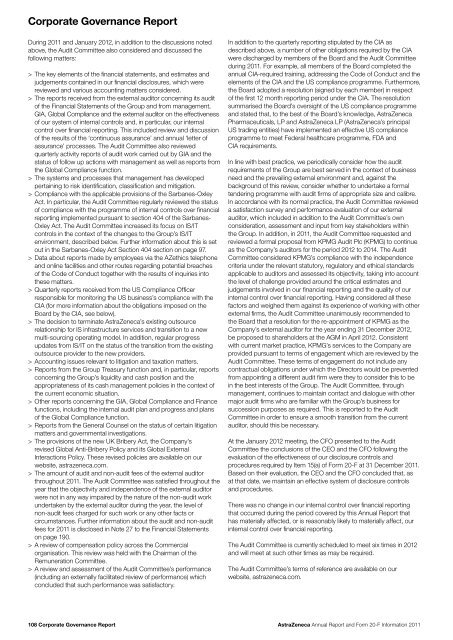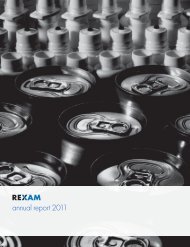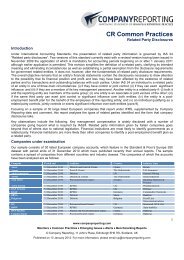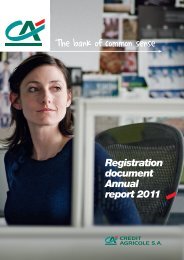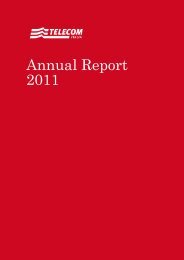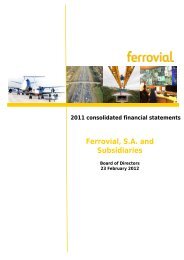AstraZeneca Annual Report and Form 20-F Information 2011
AstraZeneca Annual Report and Form 20-F Information 2011
AstraZeneca Annual Report and Form 20-F Information 2011
- No tags were found...
You also want an ePaper? Increase the reach of your titles
YUMPU automatically turns print PDFs into web optimized ePapers that Google loves.
Corporate Governance <strong>Report</strong>During <strong>20</strong>11 <strong>and</strong> January <strong>20</strong>12, in addition to the discussions notedabove, the Audit Committee also considered <strong>and</strong> discussed thefollowing matters:> The key elements of the financial statements, <strong>and</strong> estimates <strong>and</strong>judgements contained in our financial disclosures, which werereviewed <strong>and</strong> various accounting matters considered.> The reports received from the external auditor concerning its auditof the Financial Statements of the Group <strong>and</strong> from management,GIA, Global Compliance <strong>and</strong> the external auditor on the effectivenessof our system of internal controls <strong>and</strong>, in particular, our internalcontrol over financial reporting. This included review <strong>and</strong> discussionof the results of the ‘continuous assurance’ <strong>and</strong> annual ‘letter ofassurance’ processes. The Audit Committee also reviewedquarterly activity reports of audit work carried out by GIA <strong>and</strong> thestatus of follow up actions with management as well as reports fromthe Global Compliance function.> The systems <strong>and</strong> processes that management has developedpertaining to risk identification, classification <strong>and</strong> mitigation.> Compliance with the applicable provisions of the Sarbanes-OxleyAct. In particular, the Audit Committee regularly reviewed the statusof compliance with the programme of internal controls over financialreporting implemented pursuant to section 404 of the Sarbanes-Oxley Act. The Audit Committee increased its focus on IS/ITcontrols in the context of the changes to the Group’s IS/ITenvironment, described below. Further information about this is setout in the Sarbanes-Oxley Act Section 404 section on page 97.> Data about reports made by employees via the AZethics telephone<strong>and</strong> online facilities <strong>and</strong> other routes regarding potential breachesof the Code of Conduct together with the results of inquiries intothese matters.> Quarterly reports received from the US Compliance Officerresponsible for monitoring the US business’s compliance with theCIA (for more information about the obligations imposed on theBoard by the CIA, see below).> The decision to terminate <strong>AstraZeneca</strong>’s existing outsourcerelationship for IS infrastructure services <strong>and</strong> transition to a newmulti-sourcing operating model. In addition, regular progressupdates from IS/IT on the status of the transition from the existingoutsource provider to the new providers.> Accounting issues relevant to litigation <strong>and</strong> taxation matters.> <strong>Report</strong>s from the Group Treasury function <strong>and</strong>, in particular, reportsconcerning the Group’s liquidity <strong>and</strong> cash position <strong>and</strong> theappropriateness of its cash management policies in the context ofthe current economic situation.> Other reports concerning the GIA, Global Compliance <strong>and</strong> Financefunctions, including the internal audit plan <strong>and</strong> progress <strong>and</strong> plansof the Global Compliance function.> <strong>Report</strong>s from the General Counsel on the status of certain litigationmatters <strong>and</strong> governmental investigations.> The provisions of the new UK Bribery Act, the Company’srevised Global Anti-Bribery Policy <strong>and</strong> its Global ExternalInteractions Policy. These revised policies are available on ourwebsite, astrazeneca.com.> The amount of audit <strong>and</strong> non-audit fees of the external auditorthroughout <strong>20</strong>11. The Audit Committee was satisfied throughout theyear that the objectivity <strong>and</strong> independence of the external auditorwere not in any way impaired by the nature of the non-audit workundertaken by the external auditor during the year, the level ofnon-audit fees charged for such work or any other facts orcircumstances. Further information about the audit <strong>and</strong> non-auditfees for <strong>20</strong>11 is disclosed in Note 27 to the Financial Statementson page 190.> A review of compensation policy across the Commercialorganisation. This review was held with the Chairman of theRemuneration Committee.> A review <strong>and</strong> assessment of the Audit Committee’s performance(including an externally facilitated review of performance) whichconcluded that such performance was satisfactory.In addition to the quarterly reporting stipulated by the CIA asdescribed above, a number of other obligations required by the CIAwere discharged by members of the Board <strong>and</strong> the Audit Committeeduring <strong>20</strong>11. For example, all members of the Board completed theannual CIA-required training, addressing the Code of Conduct <strong>and</strong> theelements of the CIA <strong>and</strong> the US compliance programme. Furthermore,the Board adopted a resolution (signed by each member) in respectof the first 12 month reporting period under the CIA. The resolutionsummarised the Board’s oversight of the US compliance programme<strong>and</strong> stated that, to the best of the Board’s knowledge, <strong>AstraZeneca</strong>Pharmaceuticals, LP <strong>and</strong> <strong>AstraZeneca</strong> LP (<strong>AstraZeneca</strong>’s principalUS trading entities) have implemented an effective US complianceprogramme to meet Federal healthcare programme, FDA <strong>and</strong>CIA requirements.In line with best practice, we periodically consider how the auditrequirements of the Group are best served in the context of businessneed <strong>and</strong> the prevailing external environment <strong>and</strong>, against thebackground of this review, consider whether to undertake a formaltendering programme with audit firms of appropriate size <strong>and</strong> calibre.In accordance with its normal practice, the Audit Committee revieweda satisfaction survey <strong>and</strong> performance evaluation of our externalauditor, which included in addition to the Audit Committee’s ownconsideration, assessment <strong>and</strong> input from key stakeholders withinthe Group. In addition, in <strong>20</strong>11, the Audit Committee requested <strong>and</strong>reviewed a formal proposal from KPMG Audit Plc (KPMG) to continueas the Company’s auditors for the period <strong>20</strong>12 to <strong>20</strong>14. The AuditCommittee considered KPMG’s compliance with the independencecriteria under the relevant statutory, regulatory <strong>and</strong> ethical st<strong>and</strong>ardsapplicable to auditors <strong>and</strong> assessed its objectivity, taking into accountthe level of challenge provided around the critical estimates <strong>and</strong>judgements involved in our financial reporting <strong>and</strong> the quality of ourinternal control over financial reporting. Having considered all thesefactors <strong>and</strong> weighed them against its experience of working with otherexternal firms, the Audit Committee unanimously recommended tothe Board that a resolution for the re-appointment of KPMG as theCompany’s external auditor for the year ending 31 December <strong>20</strong>12,be proposed to shareholders at the AGM in April <strong>20</strong>12. Consistentwith current market practice, KPMG’s services to the Company areprovided pursuant to terms of engagement which are reviewed by theAudit Committee. These terms of engagement do not include anycontractual obligations under which the Directors would be preventedfrom appointing a different audit firm were they to consider this to bein the best interests of the Group. The Audit Committee, throughmanagement, continues to maintain contact <strong>and</strong> dialogue with othermajor audit firms who are familiar with the Group’s business forsuccession purposes as required. This is reported to the AuditCommittee in order to ensure a smooth transition from the currentauditor, should this be necessary.At the January <strong>20</strong>12 meeting, the CFO presented to the AuditCommittee the conclusions of the CEO <strong>and</strong> the CFO following theevaluation of the effectiveness of our disclosure controls <strong>and</strong>procedures required by Item 15(a) of <strong>Form</strong> <strong>20</strong>-F at 31 December <strong>20</strong>11.Based on their evaluation, the CEO <strong>and</strong> the CFO concluded that, asat that date, we maintain an effective system of disclosure controls<strong>and</strong> procedures.There was no change in our internal control over financial reportingthat occurred during the period covered by this <strong>Annual</strong> <strong>Report</strong> thathas materially affected, or is reasonably likely to materially affect, ourinternal control over financial reporting.The Audit Committee is currently scheduled to meet six times in <strong>20</strong>12<strong>and</strong> will meet at such other times as may be required.The Audit Committee’s terms of reference are available on ourwebsite, astrazeneca.com.108 Corporate Governance <strong>Report</strong><strong>AstraZeneca</strong> <strong>Annual</strong> <strong>Report</strong> <strong>and</strong> <strong>Form</strong> <strong>20</strong>-F <strong>Information</strong> <strong>20</strong>11


